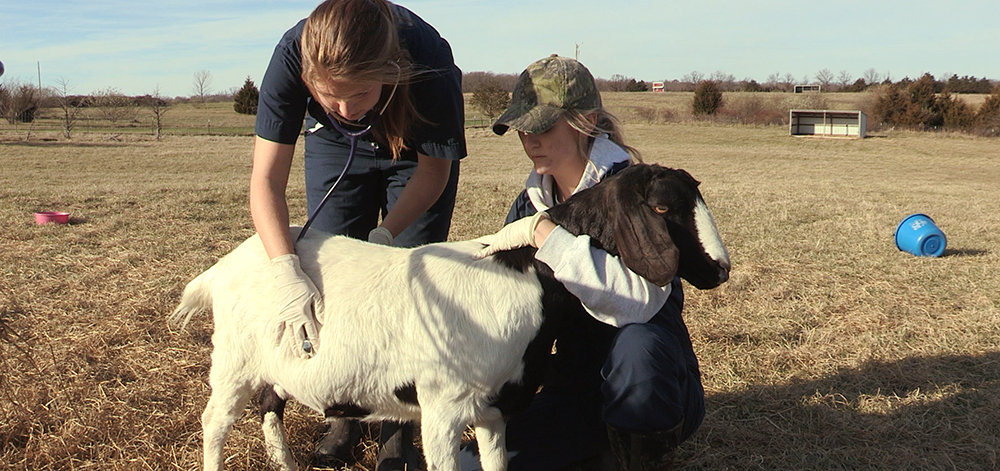 Despite good husbandry practices, small ruminants are susceptible to a variety of diseases and disorders that warrant rapid veterinary attention. The VHC Food Animal Hospital is pleased to be able to provide emergency care either in our state-of-the-art facilities or on your farm via our ambulatory services. If you are unsure that what you are observing constitutes a true emergency, our veterinarians would be happy to talk with you by telephone to help make the best decision for you and your animal.
Despite good husbandry practices, small ruminants are susceptible to a variety of diseases and disorders that warrant rapid veterinary attention. The VHC Food Animal Hospital is pleased to be able to provide emergency care either in our state-of-the-art facilities or on your farm via our ambulatory services. If you are unsure that what you are observing constitutes a true emergency, our veterinarians would be happy to talk with you by telephone to help make the best decision for you and your animal.
In general, animals that are unable to rise, are poorly responsive, are uncoordinated or staggering, have obvious abdominal distention or are experiencing respiratory distress should be seen as soon as possible. Most of the conditions that bring about these signs are best treated early, and the likelihood of a positive outcome typically declines with time.
Common Emergencies of Sheep and Goats
Blockage of the urinary flow by urinary stones (urolithiasis) is common in male goats and sheep, particularly in wethers. Affected animals may dribble urine, or urine flow may be blocked completely. Any urine they do produce may be bloody.
Affected animals will often strain, flag their tail (goats) and may cry out as if in pain. In general, sheep and goats do not strain to defecate, and any straining observed should be considered straining to urinate until proven otherwise. Urinary obstruction is a serious emergency, and early intervention is required to prevent rupture of the urinary tract.
Many parasites can infect sheep and goats. Some may cause weight loss, while others may cause a drop in the red blood cell concentration (anemia) and protein content (hypoproteinemia) of the blood. Anemic animals are often weak, lethargic and unwilling to eat. These animals will have pale membranes, as evaluated by the FAMACHA test. Hypoproteinemia will lead to fluid accumulation under the jaw (bottle jaw).
Deworming animals with these clinical signs is often the first step in treatment. It is critical to recognize that deworming may eliminate the parasites, but it does not correct the anemia and hypoproteinemia. In severely affected animals secondary conditions may arise that can require care beyond deworming.
This is a metabolic disturbance that results in necrosis of parts of the brain. This disorder can be rapidly fatal if not treated. Affected animals often interact with other animals and their environment abnormally. They may aimlessly walk around, circle, stumble, act blind or lie down with their head stretched over their back. These animals require immediate care for a successful outcome.
There are a variety of conditions that can interfere with an animal’s ability to breathe, including pneumonia. Although animals with nasal discharge or a cough may be able to wait for a regularly scheduled appointment, animals standing with their head and neck outstretched with an increased respiratory rate or effort, or in overt distress should be seen immediately.
Usually seen after a large, carbohydrate-rich meal, this disorder can produce shock and death if not treated quickly. These animals may be listless or recumbent. They will often have a distended, sometimes fluid-filled abdomen. Watery diarrhea is often present. Animals with severe grain overload require immediate attention for a successful outcome.
Diseases of the Late Gestation/Early Lactation Ewe or Doe
Although most lambs and kids are delivered without incident, dystocias do occur, endangering the life of the mother and offspring. If your doe or ewe’s membranes have been ruptured for more than 30 minutes and there is still no offspring, call for assistance. Malpositioning of the baby or inadequate size of the birth canal may be impeding passage of the baby. Malposition may be corrected by manipulation of the baby, but Cesarean section is sometimes required. An inadequate birth canal size will always require a Cesarean section.
Occasionally ewes, and less commonly does, in late gestation or soon after birth become depleted in the crucial electrolyte calcium. Clinical signs include twitching (especially in the face), stumbling and hyperactivity. This may progress to recumbency and poor responsiveness. Clinical signs often occur after some degree of sustained exercise. If you notice any of these signs, it is best to call for emergency evaluation as the condition can be readily treated by calcium supplementation. Failure to treat in a timely fashion can result in death.
Ewes and does in late gestation carrying twins or triplets are susceptible to a state of negative energy balance known as pregnancy toxemia. It is critical that animals carrying more than one baby continue to eat. Going off feed for any reason may predispose the animal to pregnancy toxemia. Early signs may include decreased feed intake, separation from the herd or a dull, listless appearance. As the disease progresses animals may lie down and refuse to get up, grind their teeth, have seizures or tremors, or act as if blind. Early treatment is critical to saving the life of the ewe or doe.



